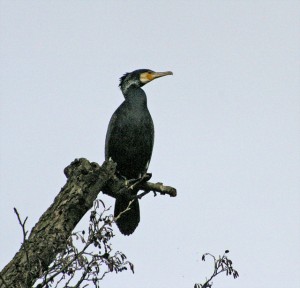It’ll take me a few days to gather my thoughts about my first-ever trip to Kalamazoo, so as a place-holder, I’ll offer most of my half of the collaborative presentation Lowell Duckert and I did on Sea Change / World change in the GW-MEMSI panel organized by Jeffrey Cohen. The full panel, which brought together six pairs of speakers collectively charged to imagine “The Future We Want,” was as wonderfully mind-bending as anything I’ve encountered since…well, since Alabama, I guess. Except this time compressed into 90 minutes, bewilderingly rapid, and ranging from The Battle of Maldon to multilingual poetics.
These fragments won’t give the full measure of our collaboration, which included daybreak immersion in the icy waters of Lake Michigan and ended (for now) with a public singing of Ariel’s “sea-change.” But if you imagine me as this black-winged bird, you’ll get some of the idea.
In the future I want, I am a cormorant. A screeching sea-crow, I perch on a high branch on the Tree of Life overlooking Paradise, which some call Kalamazoo.
“Various” is the word for what I see. “A happy rural seat of various view” (4.247) is the full line in Paradise Lost, but it’s just “various” that I crave. It’s what I roll around inside my bird’s mouth. Various. All of the things that inhabit this Paradise, spread out before me. Not just one thing, but another.
From my crow’s mouth I scream three horrifying truths:
Truth #1: Change fractures our desire for wholeness. It will break, all of it.
Truth #2: A better name for this planet would be Ocean, not Earth.
Truth #3: Salt water tastes bitter, flavored with the recognition that nothing lasts.
I am high enough up to tree to see Heteronyms.
The term “heteronym” refers to a member of a large group of imaginary personae, numbering over 70, in which the great 20c Portuguese poet Fernando Pessoa wrote. These authors, each of whom has an individual name, style, biography, and physical characteristics, collectively represent a rage for variety amid the poverty of identity. Multiple names and multiple selves become ways to navigate our over-abundant world. Author-ness and its auctoritee become various, and the original self appears one of many voices, and not the most important one. The most influential heteronym, Alberto Caeiro, also looks over Paradise. “I don’t pretend to be anything more than the greatest poet in the world,” Cairo claims. “I made the greatest discovery worth making, next to which all other discoveries are games of stupid children. I noticed the Universe.”
My question for our future is, how can we become heteronyms? And my answer is, by looking over the world’s change. Variously.
My crow’s eyes snatch two quick glances out from the Tree of Life over salty vastness.
The first glance finds Bernando Soares, technically a semi-heteronym because of his close resemblance to the biographical Pessoa, and The Book of Disquiet (Livro de Desassossego), his “factless autobiography.” In a fragment that may or may not have been intended for the final work, he writes about human encounters with the ocean:
Shipwrecks? No, I never suffered any. But I have the impression that I shipwrecked all my voyages, and that my salvation lay in interspaces of unconsciousness.
— A Voyage I never Made (III)The whirl of heteronyms teaches shipwreck as identity and salvation, that no voyage arrives without disaster. Therefore we embrace suffering and seek “interspaces.”
And one last wet one, my favorite, Álvaro de Campos, from the “Maritime Ode”:
Wharf blackly reflected in still waters
The bustle on board ships,
O wandering, restless soul of people who live in ships,
Of symbolic people who come and go, and for whom nothing lasts,
For when the ship returns to port
There’s always some change on board!
Campos knows what the sea lures us into accepting. Even music won’t hold us in place.
If my cormorant-self had more time looking out over Paradise with all of you, I’d fly toward medieval heteronyms, Mary Magdalene’s various names and identities in The Golden Legend and Custance’s return to her father in the Man of Law’s Tale.
Can we sing it again, that old anthem? All together?
Nothing of him that doth fade
But doth suffer a sea change
Into something rich and strange? (1.2.400-402)

oh my, yes.
i especially like that this is tagged ‘uncategorized.’
That’s mostly b/c I forgot to play with the tags upon posting, but I do like the “uncat” category.